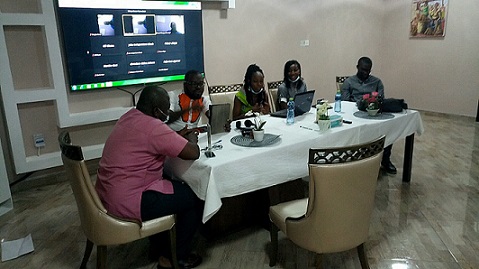CSOs and Other Stakeholders Schooled On Risk-Informed Development

The Ghana chapter of the Global Network of Civil Society Organisations for Disaster Reduction (GNDR) has oriented its members and other stakeholders on risk-informed development.
The orientation took place during the second National Coordinating Meeting of the network on Friday 4th February 2022.
Some participants joined in person whiles others joined online. The participants were made up of leaders of civil society organisations and other stakeholders from across the sixteen regions of the country.
The objective of the National Coordinating Meeting in Ghana was to orient and build the capacity of participants on risk-informed development and to agree on an action plan for the year 2022.
GNDR identifies risk as to the potential of adverse impacts on the lives and livelihoods of communities. It also determines risk by the threats people face, their vulnerability, and their capacity.
Risk-informed development prioritises risks faced by communities living in the most vulnerable situations and takes account of these risks when designing and delivering development plans and actions. It is a right-based approach that works through the perspective of the people most at risk themselves.
Risk-informed development is community led and it builds momentum across the stages of development. It also tackles power to build resilience.
During the National Coordinating Meeting, the National Focal Point in Ghana for GNDR, Madam Grace Commey stressed that the process of delivering risk-informed development needs to be localised, contextual, aspirational, anticipatory, adoptive, diagnostic, and evidence-based.
She said,” Risk-informed development should include relevant and multiple stakeholders, particularly marginalised groups, for fair, equitable, and effective results.
It needs to question and change rigid gender norms and imbalances of power that advantage boys and men over girls and women. It should also remove barriers that hinder people from taking control of their own lives and the decisions that affect them”.
The emphasized the need for risk-informed development to be community-led, participatory, collaborative, gender transformative, inclusive, and empowering. She said that risk-informed development significantly involves the perspectives of the people most at risk, enables more sustainable and resilient development, and challenges everyone involved to recognise that development choices create risk as well as opportunities.
She concluded that GNDR adopts risk-informed development to avoid creating complex risk through poor development choices, reduce complex risk by using development to reduce vulnerability and exposure, and promote iterative and constant learning to improve sustainable development and resilience.
She then recommended that members and the other stakeholders should partner with communities and enable community led implementation, monitoring, and evaluation. Robert Tanti Ali Executive Director of Youth Alliance for Development) also assisted in the facilitation of the meeting.
Source: Martha Osei-Bobie




